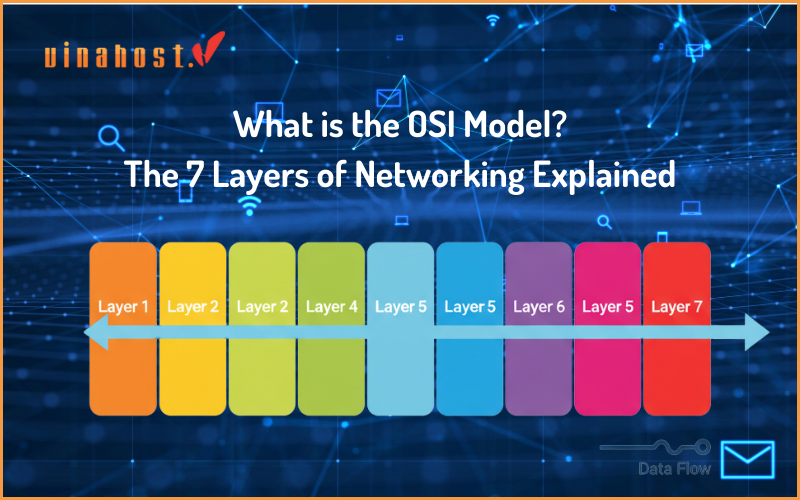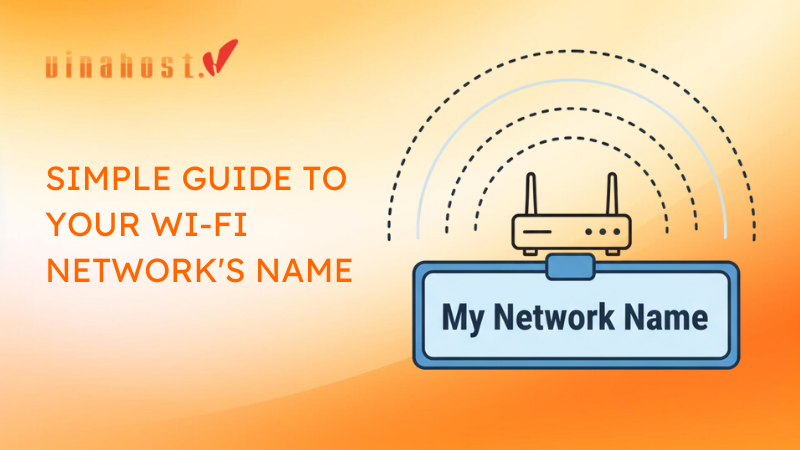Both VPS and dedicated server offer significant advantages over shared hosting, they cater to different needs and budgets. This article delves into the key differences between VPS and Dedicated Servers, empowering you to make an informed decision for your website’s growth. Whether you’re managing a growing e-commerce store, a high-traffic blog, or a security-critical application, understanding the strengths and limitations of VPS and Dedicated Servers will equip you with the knowledge to choose the ideal hosting solution for your online success. Check out VinaHost‘s article now!
1. Oview of VPS Hosting
1.1. What is VPS Hosting?
A Virtual Private Server (VPS) is a hosting environment that mimics a dedicated server within a shared physical server. Using virtualization technology, a single physical server is partitioned into multiple isolated virtual servers, each with its own operating system, resources, and configurations.
VPS hosting provides users with dedicated resources like CPU, RAM, and storage, ensuring better performance, customization, and control compared to shared hosting. It is a cost-effective solution suitable for medium to large websites, applications, and businesses needing more power and flexibility without the expense of a dedicated server.
1.2. How Does VPS work?

A powerful physical server with high-performance hardware is set up in a data center. This server has substantial CPU power, RAM, storage, and network capabilities to support multiple virtual environments.
Specialized software known as a hypervisor (e.x., VMware, KVM, Hyper-V) is installed on the physical server. The hypervisor creates and manages the virtual machines (VMs), or virtual servers, by allocating a portion of the physical server’s resources to each VM.
The hypervisor partitions the physical server into several virtual servers. Each VPS is allocated a specific amount of CPU power, RAM, storage, and other resources. These allocations ensure that each VPS operates independently and does not interfere with the performance of others.
Each VPS runs its own operating system (OS), which can be different from the OS of the other VPSs on the same physical server. This independence allows users to install, configure, and manage software and applications as needed.
The hypervisor manages the distribution of resources and ensures that each VPS gets the allocated resources without affecting others. It also provides isolation, meaning that if one VPS experiences issues (e.g., crashes, security breaches), it does not impact the other VPSs on the same physical server.
Users access their VPS through remote desktop protocols (RDP for Windows) or secure shell (SSH for Linux). They have root or administrative access, allowing them to manage their server environment, install software, and configure settings.
VPS hosting offers scalability, enabling users to easily upgrade or downgrade their resources (such as CPU, RAM, and storage) as their needs change. This flexibility makes it ideal for growing websites and applications.
Each VPS operates in a sandboxed environment, meaning the actions and performance of one VPS do not affect others. This isolation enhances security and ensures consistent performance across all virtual servers.
1.3. Pros of using a VPS
VPS hosting provides a balance between control, performance, security, and cost:
- Improved performance and stability: VPS deliver superior performance due to dedicated resources. Each VPS receives a predetermined allocation of CPU, RAM, and storage, ensuring consistent performance levels even during peak traffic periods. Unlike shared hosting, where resources are shared among multiple users, VPS hosting guarantees that your website or application’s performance remains unaffected by the activities of other users on the same physical server.
- Flexible scalability: VPS hosting offers unmatched scalability, enabling users to seamlessly adjust resources such as CPU, RAM, and storage as their needs evolve. Whether it’s vertical scaling within the same VPS plan or horizontal scaling by adding additional VPS instances, users have the flexibility to scale resources dynamically to accommodate changes in website traffic, application demands, or business growth.
- Increased control and flexibility: VPS hosting provides users with unparalleled control over their server environment. With root access, users have administrative privileges, allowing them to install, configure, and customize software and applications according to their specific requirements. This level of control empowers users to tailor their VPS to meet the unique demands of their projects or businesses, whether it involves selecting a preferred operating system, control panel, or software stack.
- Enhanced security features: Security is a top priority in VPS hosting, with each VPS operating within its own isolated virtual environment. This isolation ensures that resources are dedicated exclusively to the user’s VPS, minimizing the risk of security breaches caused by other users. Additionally, users can implement custom security measures such as firewalls, intrusion detection systems, and SSL certificates to further enhance the security of their VPS.
- Cost-Effectiveness: While VPS hosting may be more expensive than shared hosting, it offers unparalleled value for money by providing the perfect balance between affordability and performance. The benefits of dedicated resources, control, and reliability justify the higher cost of VPS hosting, making it an ideal choice for businesses and individuals with moderate budgets seeking a reliable hosting solution that doesn’t compromise on performance or security.
- Customization: VPS hosting allows users to customize their server environment to suit their specific needs and preferences. From selecting the operating system and control panel to installing and configuring software stacks, users have the freedom to create a tailored hosting environment that aligns perfectly with their project requirements. This level of customization makes VPS hosting an ideal choice for developers, businesses, and individuals seeking a flexible and adaptable hosting solution.
- Higher uptime and reliability: With dedicated resources and isolation from other users, VPS hosting offers unparalleled reliability and uptime. Users can expect enhanced uptime compared to shared hosting, with minimal disruptions to their website or application’s availability. Additionally, some VPS and Dedicated Server providers offer redundant infrastructure and failover mechanisms to further enhance reliability and ensure continuous operation even in the event of hardware failures or maintenance activities.
1.4. Cons of using a VPS
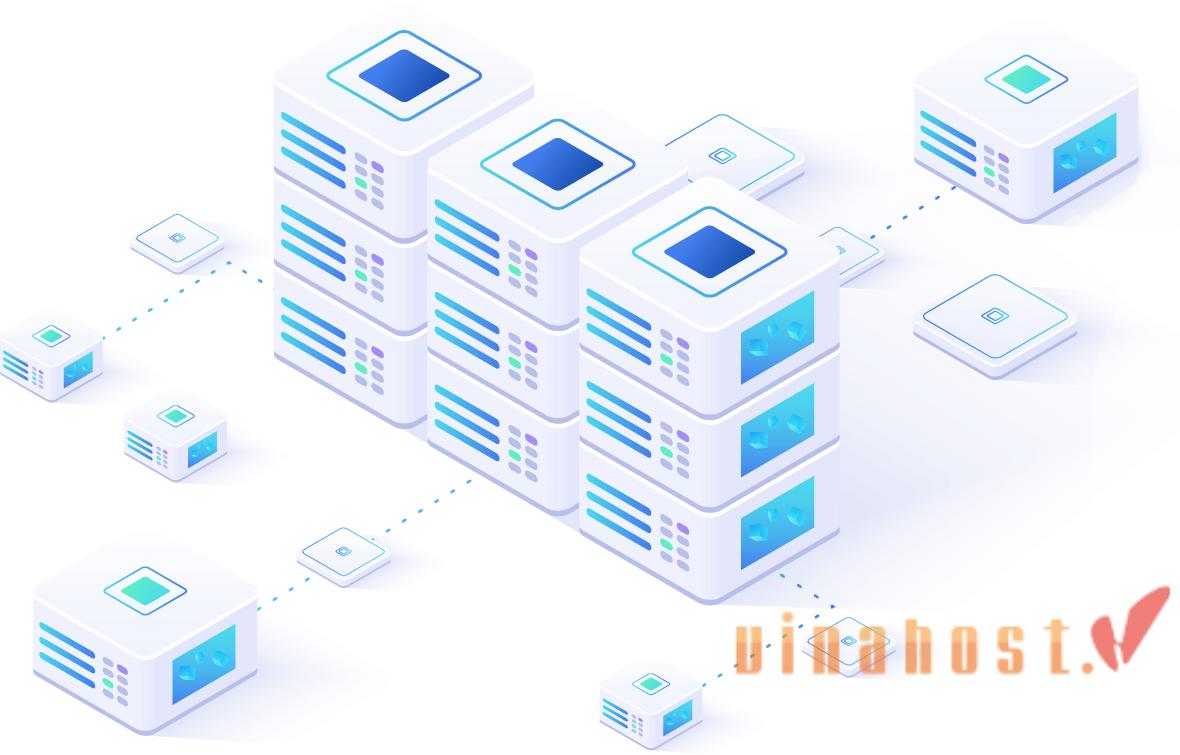
- Management complexity: Managing a VPS requires a certain level of technical expertise, especially with unmanaged VPS hosting. Users are responsible for tasks such as server setup, maintenance, updates, and security configurations. For individuals or businesses without the necessary skills or resources, managing a VPS can be challenging and time-consuming.
- Limited scalability compared to dedicated servers: While VPS hosting offers dedicated resources, these resources are still finite and can be exceeded under certain conditions. If a virtual server exceeds its allocated resources, it can meet performance issues or even downtime. Users must monitor resource usage and ensure that their VPS plan meets the demands of their website or application.
- Higher cost: VPS hosting tends to be more expensive than shared hosting, which can be a concern for users with limited budgets or small-scale projects. The higher cost reflects the dedicated resources and increased control provided by VPS hosting, but it may not be feasible for all users, particularly those with lower resource requirements.
- Complexity of scaling: While VPS hosting is scalable, scaling resources can sometimes be complex, especially for users unfamiliar with server management. Vertical scaling (upgrading resources within the same VPS plan) is relatively straightforward, but horizontal scaling (adding additional VPS instances) requires more advanced configuration and management.
- Shared physical server: Although each VPS operates in an isolated virtual environment, it still shares physical resources with other VPS instances on the same physical server. Issues at the hardware level or with the hypervisor can potentially impact all VPS hosted on that server, leading to downtime or performance degradation.
Also Read: What is a Server? Understanding the Backbone of Modern Technology
2. Oview of Dedicated Server
2.1. What is Dedicated Server?
A dedicated server is a type of hosting service where an entire physical server is leased to a single client or user. In this setup, the client has exclusive access to all the resources (CPU, RAM, storage, bandwidth) of the server without sharing them with other users.
Dedicated servers are often used by businesses or individuals with high traffic websites, resource-intensive applications, or specific hosting requirements that cannot be met by shared or VPS hosting.
The dedicated server can be used to host various types of services, including websites, web applications, databases, email servers, game servers, and more. The client can deploy and manage these services on their dedicated server according to their specific hosting requirements.
Also Read: What is a Dedicated Server? | How Does a Dedicated Server Work?
2.2. How does Dedicated Server work?
A dedicated server works by providing exclusive access to a physical server’s resources, allowing clients to customize and manage the server environment to meet their specific hosting needs.
It starts with the provisioning of a physical server by a hosting provider. This is a robust machine equipped with high-performance hardware components such as CPU, RAM, storage drives, and network interfaces.
Once the physical server is set up, it needs to be configured according to the client’s requirements. This includes installing the chosen operating system (e.x., Linux, Windows), setting up networking, configuring storage drives, and installing any necessary software or applications.
Unlike shared or VPS hosting, where resources are divided among multiple users or virtual environments, a dedicated server provides exclusive access to all its resources. This means that the client has full control over the CPU, RAM, storage, and bandwidth of the server without sharing them with anyone else.
The client has administrative access to the dedicated server, allowing them to manage and customize the server environment as needed. They can install, configure, and update software, set up security measures, manage user accounts, and monitor server performance. This is one of the difference between VPS and Dedicated Server Hosting.
2.3. Pros of using a Dedicated Server
Dedicated servers are the ultimate solution for businesses or organizations that require the highest level of performance, security, and control over their data and applications.

- Unmatched performance and scalability: A dedicated server allocates all its processing power, memory (RAM), and storage to your use. This translates to the smoothest operation possible for your websites or applications, even during peak traffic periods. If your needs grow, you can easily upgrade the server’s hardware to handle increased demands. This is the key difference between VPS and Dedicated Server hosting.
- Enhanced security: Unlike shared hosting where multiple users reside on a single server, a dedicated server is yours alone. This isolation provides the ultimate control over security. You can implement robust security measures and configurations to safeguard your data and applications from unauthorized access or malware threats.
- Ideal for resource-intensive applications: Dedicated servers excel at handling applications that require significant resources. Complex databases, video streaming services, large-scale gaming servers, or any software demanding high processing power, memory, or storage can run optimally on a dedicated server.
- Complete control and customization: A dedicated server grants you full reign over the server environment. You can install any software you need, customize configurations to optimize performance for your specific applications, and fine-tune security measures to meet your exact requirements.
- Reliability and uptime: Dedicated servers are typically housed in secure data centers with robust infrastructure and backup power supplies. This translates to a significant reduction in downtime risk compared to shared hosting, ensuring your website or application remains accessible to users.
2.4. Cons of using a Dedicated Server
While dedicated servers offer unparalleled control, performance, security, and reliability, they also come with challenges such as higher costs, management complexity, scalability limitations, and ongoing maintenance requirements.
- Higher cost: Physical server may be one of the most expensive hosting choice. You’re paying for the exclusive use of a powerful computer and the associated maintenance costs. This can be a significant hurdle for small businesses or individuals with limited budgets.
- Technical expertise required: Managing a dedicated server effectively requires a high level of technical knowledge of server administration, security, and troubleshooting. Tasks like installing the operating system, configuring security settings, and maintaining software updates can be complex for non-technical users.
- Initial Setup Time: Setting up a dedicated server can take time, particularly if custom configurations or software installations are required. This initial setup period may result in delays before the server is fully operational and ready to host applications or services.
- Ongoing maintenance: Dedicated servers require regular maintenance to ensure optimal performance, security, and reliability. This includes applying software updates, monitoring server health, performing backups, and addressing any technical issues that arise. Failure to perform regular maintenance can lead to security vulnerabilities or performance degradation over time.
- Potential for downtime if unmanaged: While data centers offer high uptime, unforeseen hardware failures or software issues can cause downtime if you’re managing the server yourself. Having a backup plan and disaster recovery strategy is crucial.
- Limited scalability compared to cloud hosting: While dedicated servers offer scalability by upgrading hardware, it might not be as flexible as cloud hosting. Cloud hosting allows you to dynamically scale resources up or down based on real-time needs.
Also Read: What is a Cloud Server? | How does a Cloud Server work?
3. What is difference between VPS and Dedicated Server Hosting?
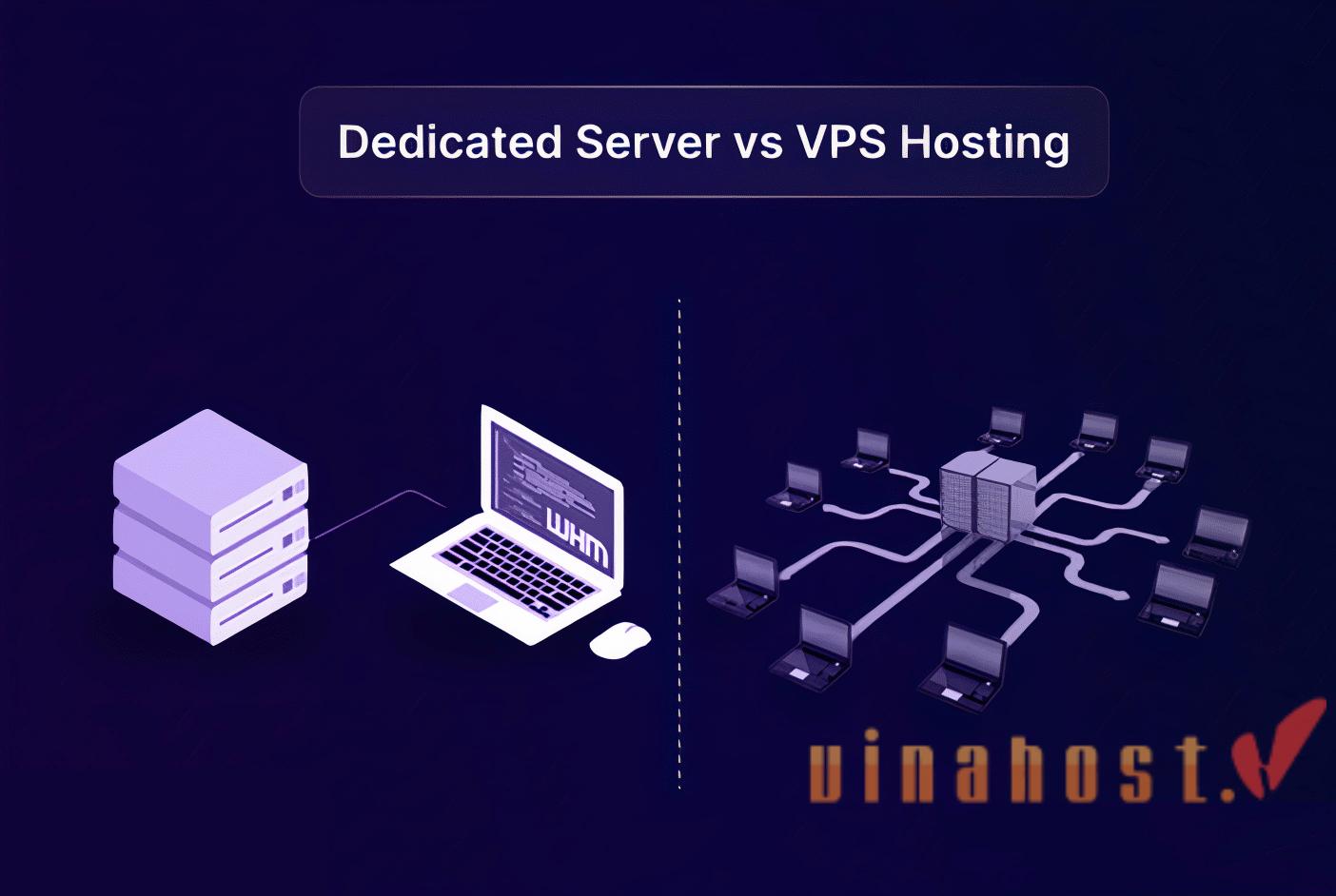
3.1. Cost
Difference between VPS and Dedicated Server Hosting cost:
- VPS: More expensive than shared hosting, but significantly cheaper than dedicated servers.
>>> You can refer to VinaHost VPS and dedicated server pricing below:
| Service Pack | Cheap-SSD1 | Cheap-SSD2 | Cheap-SSD3 | Cheap-SSD4 | Cheap-SSD5 | Cheap-SSD6 |
|---|---|---|---|---|---|---|
| Price | 3.61 USD/Month | 7.01 USD/Month | 10.63 USD/Month | 15.51 USD/Month | 19.13 USD/Month | 30.81 USD/Month |
| vCPU | 1 | 2 | 3 | 4 | 4 | 6 |
| RAM | 1 GB | 2 GB | 3 GB | 4 GB | 6 GB | 8 GB |
| SSD | 25 GB | 40 GB | 60 GB | 80 GB | 100 GB | 120 GB |
| Minimum payment | 3 Months | 3 Months | 1 Month | 1 Month | 1 Month | 1 Month |
| IOPS | 21k/7k | 21k/7k | 21k/7k | 21k/7k | 21k/7k | 21k/7k |
| Weekly Data Backup | Charge | Charge | Charge | Charge | Charge | Charge |
| DirectAdmin | Charge | Free | Free | Free | Free | Free |
| Data Transfer | Unlimited | Unlimited | Unlimited | Unlimited | Unlimited | Unlimited |
| IPv6 Support | ||||||
| Free SSL | ||||||
| Automatic Activation | ||||||
| Virtualizor | ||||||
- Dedicated Server: Most expensive option as you’re paying for exclusive use of the server’s resources.
| Service Pack | Xeon Quad Core E3 V1-2-3 Series | Xeon Quad Core E3 V4-5 Series | Xeon 6 Core Series | Xeon 8 Core Series | Xeon 10-12 Core Series | Xeon 14 Core Series | Xeon 18 Core Series |
|---|---|---|---|---|---|---|---|
| Price | 125.00 USD/Month | 165.00 USD/Month | 195.00 USD/Month | 245.00 USD/Month | 285.00 USD/Month | 305.00 USD/Month | 405.00 USD/Month |
| Server brand | SuperMicro, Dell | SuperMicro, Dell | SuperMicro, Dell | SuperMicro, Dell | SuperMicro, Dell | SuperMicro, Dell | SuperMicro, Dell |
| HDD | 2 x 500 GB SATA | 2 x 500 GB SATA | 2 x 240GB SSD or 2 x 600GB SAS or 2 x 1TB SATA | 2 x 240GB SSD or 2 x 600GB SAS or 2 x 1TB SATA | 2 x 240GB SSD or 2 x 600GB SAS or 2 x 1TB SATA | 2 x 240GB SSD or 2 x 600GB SAS or 2 x 1TB SATA | 2 x 240GB SSD or 2 x 600GB SAS or 2 x 1TB SATA |
| CPU physical cores | 4 Cores | 4 Cores | 6 Cores | 8 Cores | 10 – 12 Cores | 14 Cores | 18 Cores |
| RAM | 16 GB | 16 GB | 32 GB | 32 GB | 32 GB | 32 GB | 32 GB |
| Minimum payment | 1 month | 1 month | 1 month | 1 month | 1 month | 1 month | 1 month |
| Data transfer | Unlimited | Unlimited | Unlimited | Unlimited | Unlimited | Unlimited | Unlimited |
| Bandwidth | 100Mbps | 100Mbps | 100Mbps | 100Mbps | 100Mbps | 100Mbps | 100Mbps |
| Setup fee | $40.00 | $40.00 | $40.00 | $40.00 | $40.00 | $40.00 | $40.00 |
| IPv4 | 1 | 1 | 1 | 1 | 1 | 1 | 1 |
| IPv6 | 16 | 16 | 16 | 16 | 16 | 16 | 16 |
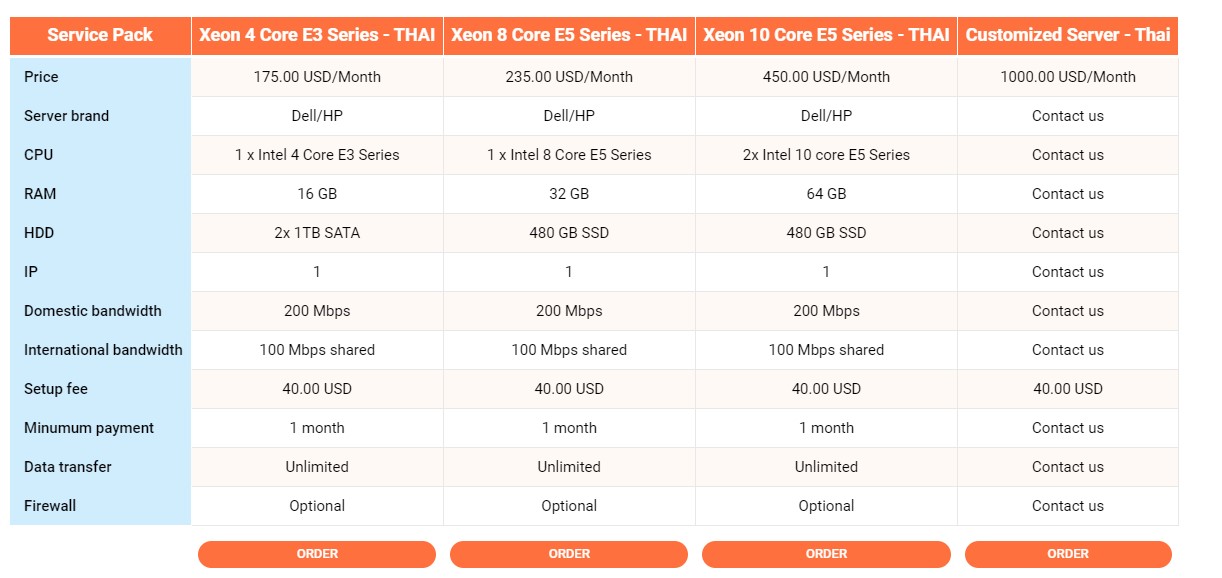
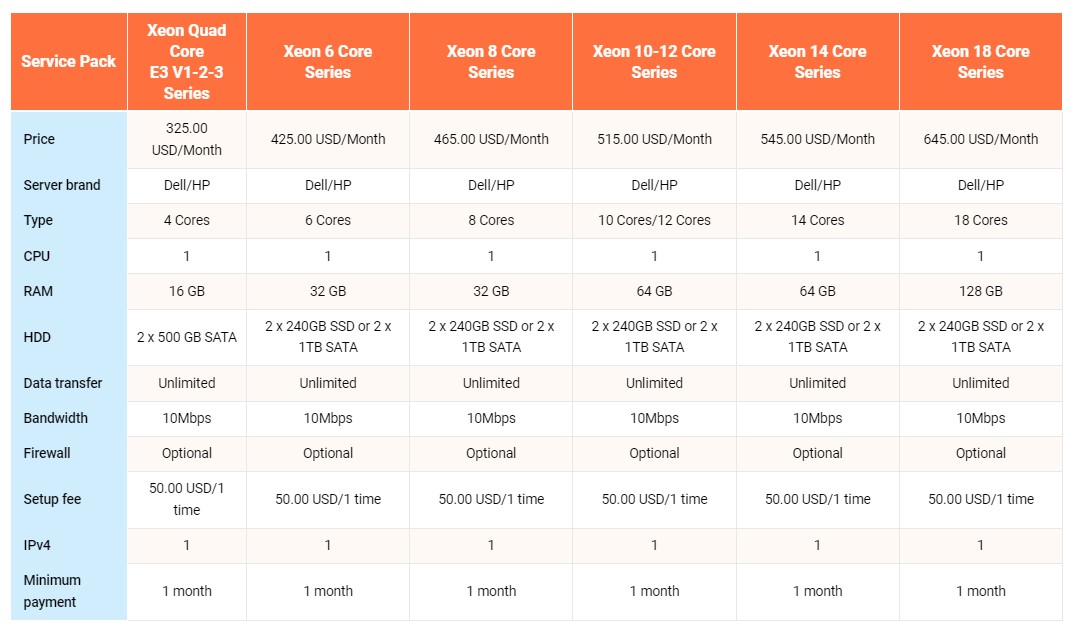
Other Services
3.2. Flexibility
Difference between VPS and Dedicated Server Hosting flexibility:
- VPS: Offers more flexibility than shared hosting as you have root access and can install your own software. However, flexibility is limited compared to a dedicated server.
- Dedicated Server: Provides the most flexibility. You have complete control over the server environment and can customize it to your exact needs.
3.3. Performance
Difference between VPS and Dedicated Server Hosting performance:
- VPS: Offers dedicated resources (CPU, RAM, storage) but shares the physical server with other VPS users. Performance is generally good but can be impacted by activity on other VPSes.
- Dedicated Server: Delivers the highest performance as you have exclusive access to all the server’s resources. Performance remains consistent and unaffected by other users.
3.4. Scalability
Difference between VPS and Dedicated Server Hosting scalability:
- VPS: Moderately scalable. You can usually upgrade your VPS plan to get more resources if needed, but scalability might be limited compared to dedicated servers.
- Dedicated Server: Highly scalable. You can upgrade the server’s hardware components (CPU, RAM, storage) to handle increased demands.
3.5. Security
Difference between VPS and Dedicated Server Hosting security:
- VPS: Offers a higher level of security compared to shared server hosting. Each VPS operates in an isolated environment, reducing the risk of security breaches from other users.
- Dedicated Server: Offers enhanced security with exclusive access to resources. Users have full control over security configurations, making it easier to implement custom security measures.
3.6. Resource allocation
Difference between VPS and Dedicated Server Hosting allocation:
- VPS: Resources are allocated virtually, with each VPS receiving a portion of the physical server’s resources. Resource allocation is managed by the hosting provider.
- Dedicated Server: Resources are dedicated exclusively to the client, providing full access to all CPU, RAM, storage, and bandwidth. Users have complete control over resource allocation and usage.
Also read: Maximizing Efficiency and Performance: What is a Blade Server?
4. How to choose Between VPS and Dedicated Server
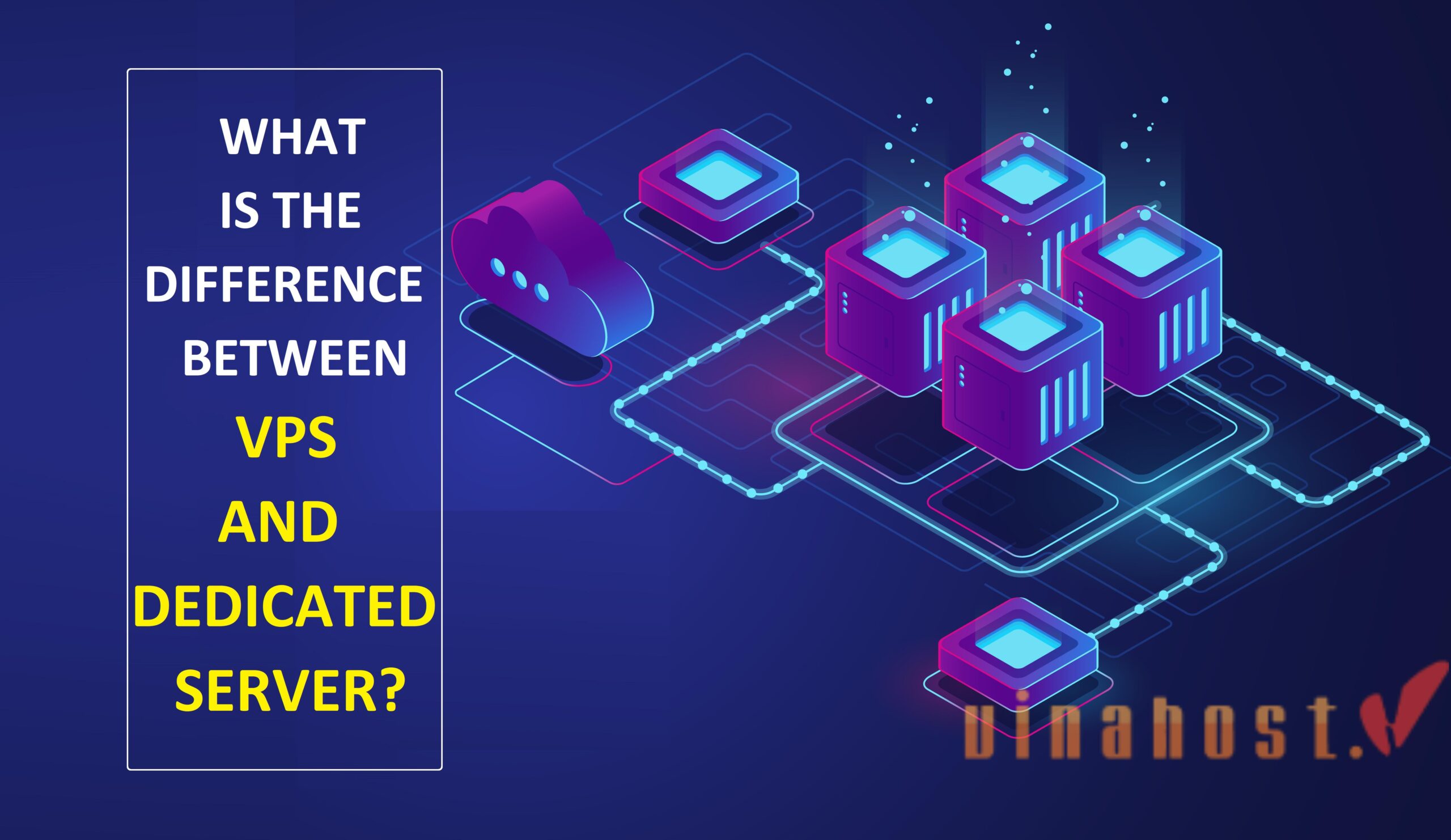
While VPS hosting offers affordability, scalability, and flexibility for small to medium-sized businesses with moderate resource requirements, dedicated server hosting is ideal for enterprises, high-traffic websites, and resource-intensive applications that demand exclusive resources, customization, security, and predictable performance.
Here are some real-world cases where you might choose between a VPS and dedicated server:
Good use cases for a VPS:
- Growing e-commerce store: An online store that’s experiencing steady growth in traffic and sales might find shared hosting limiting. A VPS offers a good balance of affordability and increased performance to handle more customers and product listings.
- Business website with a content management system (CMS): A company website built on a CMS like WordPress or Drupal can benefit from the stability and control of a VPS. You can install plugins and themes to customize the website and have more control over security updates.
- Development and testing environment: For developers building and testing web applications, a VPS provides a more isolated environment than shared hosting. This allows testing new features or code changes without impacting a live website.
- Small to medium sized blogs: If you run a blog with a dedicated audience and experience moderate traffic, a VPS can be a good option. It offers improved performance compared to shared hosting to handle spikes in traffic during popular posts.
Good use cases for a Dedicated Server:
- High-traffic news website: A news website with a massive daily readership needs consistent top-tier performance to ensure a smooth user experience. A dedicated server guarantees the resources required to handle heavy traffic loads without slowdowns.
- Online gaming server: For running an online multiplayer game, a dedicated server provides the processing power and low latency required for a responsive and lag-free gaming experience for players.
- Financial services company: Financial institutions dealing with sensitive data require the utmost security. A dedicated server allows for robust security measures and complete control over the server environment to protect sensitive financial information.
- Large-scale e-commerce platform: A major online store with a vast product catalog and millions of customers needs a dedicated server to handle high transaction volumes, ensure fast loading times, and guarantee stability during peak shopping seasons.
- Businesses with unpredictable traffic spikes: If your website or application experiences unpredictable surges in traffic, a dedicated server offers the scalability to handle these spikes without performance degradation.
5. FAQs
5.1. Is a VPS powerful enough for my website?
Whether a VPS is powerful enough for your website depends on your specific requirements and priorities.
How many visitors does your website get on average per day or month? If you have a relatively small and consistent visitor base, a VPS might be sufficient.
Besides, simple websites with static content typically require fewer resources than dynamic websites with databases or user interactions. Complex applications or e-commerce stores with many products might necessitate a VPS.
You should monitor your current resource usage on your shared hosting plan. This might include CPU, RAM, and storage. If you’re constantly nearing the limits, a VPS with more allocated resources would be beneficial.
If you anticipate significant growth in traffic or website complexity in the near future, a VPS might be a wise investment to avoid future limitations.
Choose a reputable VPS and Dedicated Server provider that can analyze your website’s needs and recommend an appropriate plan.
5.2. Can I upgrade from a VPS to a dedicated server later?
Yes, upgrading from a VPS to a dedicated server is a very common practice as your website’s needs evolve. Upgrading to a dedicated server empowers you with greater control, security, and scalability as your website flourishes.
Most VPS and Dedicated Server providers offer the flexibility to upgrade from a virtual private server to a dedicated server later on as your website or application grows and your hosting needs evolve.
Upgrading from a VPS to a dedicated server is usually a straightforward process with most VPS and Dedicated Server providers. Here’s upgrade process:
- Contact your hosting provider: Inform your provider of your intention to upgrade. They can help you choose the appropriate dedicated server plan based on your resource requirements.
- Data backup and migration: The provider will likely assist you in backing up your website data and applications from your VPS. They may offer migration tools or services to transfer your data to the new dedicated server.
- Server configuration (optional): Depending on your technical expertise and the provider’s services, you might need to configure the dedicated server’s operating system and software. Some VPS and Dedicated Server providers offer managed dedicated server plans where they handle this configuration for you.
- DNS update: Once the upgrade is complete, you’ll need to update your website’s Domain Name System (DNS) records to point to the new dedicated server’s IP address. This ensures visitors are directed to the correct server.
- Testing and verification: Once the migration is complete, thoroughly test your website or application on the new dedicated server to ensure everything is functioning as expected. Verify that data has been transferred accurately and that all configurations are correct.
- Cancel VPS plan: Once you’ve confirmed that the migration was successful and your website or application is running smoothly on the dedicated server, you can cancel your VPS plan with your hosting provider.
Also read: [2024] What is a File Server? | Types of File Servers
5.3. What about security? Which option is more secure?
Both VPS and dedicated servers offer advantages over shared hosting, but a dedicated server generally provides the highest level of security.
Dedicated Server Hosting Security makes it potentially safer than VPS hosting:
- Exclusive resources: Dedicated server hosting provides exclusive access to all server resources, including CPU, RAM, storage, and bandwidth. This isolation ensures that the server’s resources are dedicated solely to the client, reducing the risk of security vulnerabilities caused by other users.
- Physical isolation: Dedicated servers operate on physical hardware that is dedicated to a single client. This physical isolation provides an additional layer of security, as the server is not shared with other users, minimizing the risk of unauthorized access or data breaches.
- Full control: Dedicated server hosting offers full administrative access, allowing clients to implement stringent security measures, configure firewall rules, and manage security patches to protect their server environment.
- Customization: Clients have the flexibility to customize security settings, install security software, and implement encryption protocols tailored to their specific security requirements.
However, with proper security measures and configurations, both VPS and dedicated server hosting can offer robust security for hosting websites and applications.
5.4. I’m not very technical. Can I still manage a VPS?
Yes, managing a VPS, even with limited technical expertise, is feasible through various means.
Many VPS and Dedicated Server providers offer tutorials and documentation to guide you through VPS management tasks. There are also online resources and communities where you can find help.
Moreover, most VPS and Dedicated Server providers offer managed VPS plans where they handle server administration tasks like software updates, security configurations, and troubleshooting for an additional fee.
Managed VPS hosting is a hosting service where the hosting provider takes care of server management tasks on behalf of the client. In a managed VPS hosting environment, the provider handles tasks such as server setup, configuration, maintenance, security updates, and technical support, allowing clients to focus on their websites or applications without worrying about server management responsibilities.
This is ideal for users who prefer to delegate technical tasks to experts or lack the technical expertise to manage a server independently. It offers convenience, peace of mind, and reliable support, making it a popular choice for businesses and individuals seeking a hassle-free hosting solution.
Also read: What is Server Administration? | The Future of Server Administration
6. Conclusion
Overall, the choice between VPS and Dedicated Server hosting ultimately hinges on your specific hosting requirements, budget, technical expertise, and growth plans. Throughout this exploration of the differences between VPS and Dedicated Server hosting, we’ve helped you uncovered key distinctions that can influence your decision-making process.
Regardless of your choice, both VPS and Dedicated Server hosting solutions offer advantages and cater to different hosting needs. By carefully evaluating factors such as performance, scalability, customization, security, and cost, you can choose the hosting option that best aligns with your objectives and priorities.
Whether you’re launching a new website, expanding your online presence, or upgrading your hosting environment, understanding the differences between VPS and Dedicated Server hosting empowers you to make informed decisions that optimize your online performance, reliability, and scalability.
Find out more articles at our Blog and don’t hesitate to contact us for support:
- Email: support@vinahost.vn
- Hotline: 1900 6046
- Livechat: https://livechat.vinahost.vn/chat.php
Read more:
What is a Thailand Server? | Everything You Need To Know
What is a Cambodia Server? | Everything You Need to Know


 Tiếng Việt
Tiếng Việt English
English 简体中文
简体中文


















































































